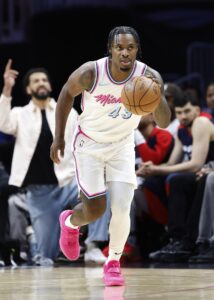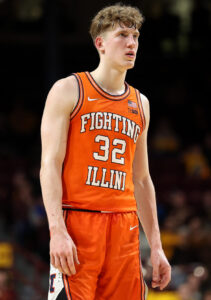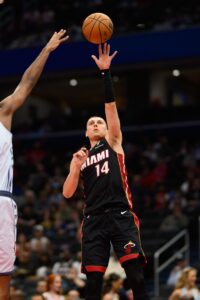Hoops Rumors is checking in on the 2025 offseason for all 30 NBA teams, recapping the summer’s free agent signings, trades, draft picks, departures, and more. We’ll take a look at each team’s offseason moves and consider what might still be coming before the regular season begins. Today, we’re focusing on the Miami Heat.
Free agent signings
 Davion Mitchell: Two years, $24,000,000. Re-signed using Bird rights.
Davion Mitchell: Two years, $24,000,000. Re-signed using Bird rights.- Dru Smith: Three years, $7,898,151. Second year non-guaranteed. Third-year team option. Re-signed using Early Bird rights.
- Dain Dainja: One year, minimum salary. Non-guaranteed (Exhibit 9). Signed using minimum salary exception.
- Trevor Keels: One year, minimum salary. Non-guaranteed (Exhibit 9). Signed using minimum salary exception.
- Gabe Madsen: One year, minimum salary. Non-guaranteed (Exhibit 9). Signed using minimum salary exception.
- Ethan Thompson: One year, minimum salary. Non-guaranteed (Exhibit 9). Signed using minimum salary exception.
- Jahmir Young: One year, minimum salary. Non-guaranteed (Exhibit 9). Signed using minimum salary exception.
Trades
- Acquired Simone Fontecchio from the Pistons in exchange for Duncan Robinson (sign-and-trade).
- Acquired Norman Powell (from Clippers) in a three-team trade in exchange for Kyle Anderson (to Jazz) and Kevin Love (to Jazz).
- Acquired the Nets’ 2026 second-round pick (top-55 protected) from the Nets in exchange for Haywood Highsmith and the Heat’s 2032 second-round pick.
Draft picks
- 1-20: Kasparas Jakucionis
- Signed to rookie scale contract (four years, $17,730,606).
Two-way signings
- Myron Gardner
- Two years, $85,300 partial guarantee; second year non-guaranteed.
- Vladislav Goldin
- One year, $85,300 partial guarantee.
Departed/unsigned free agents
- Alec Burks (unsigned)
- Josh Christopher (unsigned)
- Duncan Robinson (Pistons)
- Isaiah Stevens (Kings)
Other roster moves
- Exercised team option on Keshad Johnson ($1,955,377).
Salary cap situation
- Operating over the cap ($154.6MM) and below the luxury tax line ($187.9MM).
- Carrying approximately $186.1MM in salary.
- Hard-capped at $195,945,000.
- Full non-taxpayer mid-level exception ($14,104,000) available.
- Full bi-annual exception ($5,134,000) available.
- Five traded player exceptions available (largest worth $16,834,692).
The offseason so far
It was a forgettable season in 2024/25 for the Heat, who engaged in a lengthy standoff with disgruntled star Jimmy Butler that culminated in a deadline trade sending him to Golden State, then wrapped up the year with an underwhelming 12-21 post-deadline performance that dropped the team to the No. 10 spot in the Eastern Conference standings.
The club showed some signs of life in the play-in tournament by becoming the first No. 10 seed to win consecutive play-in games to make the playoffs, but once they got there, the Heat were on the wrong end of a historic beat-down by the top-seeded Cavaliers, who outscored Miami by a whopping 122 points in a four-game sweep.
As ugly as both the second half of the season and that first-round playoff series were, there were at least a couple positive takeaways that stemmed from the Heat’s trade deadline activity. The most obvious one was the play of Davion Mitchell, who was sent from Toronto to Miami as part of the five-team Butler blockbuster.
A defensive specialist who struggled offensively for most of his first three-and-a-half NBA seasons, Mitchell emerged as a starter and averaged 10.3 points and 5.3 assists per game with a .504/.447/.702 shooting line in 30 regular season games for the Heat. He was even better in the postseason, making 59.3% of his field goal attempts and 52.0% of his three-pointers with averages of 15.2 PPG and 6.5 APG in six play-in and playoff outings.
Mitchell’s excellent second half earned him a fully guaranteed two-year, $24MM commitment from the Heat. It was easily the most lucrative contract Miami handed out this offseason – the team’s other free agent signings will all earn the minimum in 2025/26 – and it should be a pretty safe investment as long as the offensive strides made last season by the former lottery pick weren’t a one-off.
At $12MM per year, Mitchell doesn’t necessarily need to replicate those strong second-half numbers in order to return positive value — as long as he produces enough to make opposing teams take him seriously as an offensive threat, his play on defense will keep him in the rotation on a consistent basis.
 The other notable offseason move the Heat made as a result of their Butler trade was using the No. 20 overall pick in the draft on Kasparas Jakucionis. Having won both of their play-in games, the Heat were forced to sent their own lottery-protected pick (No. 15 overall) to Oklahoma City, but they received the Warriors’ first-rounder as part of the return for Butler, then used it to draft a one-and-done point guard out of Illinois.
The other notable offseason move the Heat made as a result of their Butler trade was using the No. 20 overall pick in the draft on Kasparas Jakucionis. Having won both of their play-in games, the Heat were forced to sent their own lottery-protected pick (No. 15 overall) to Oklahoma City, but they received the Warriors’ first-rounder as part of the return for Butler, then used it to draft a one-and-done point guard out of Illinois.
Jakucionis didn’t get off to a great start at the California Classic Summer League, where he made just 1-of-15 field goals and had as many turnovers and personal fouls as points (12) in three games. But he was better in Las Vegas, and – as Jared McCain can attest – there’s certainly no guarantee a poor Summer League showing will carry over to the regular season. The Heat are optimistic about the long-term potential of Jakucionis within their developmental system.
Outside of the Mitchell signing and the Jakucionis pick, all of the Heat’s major offseason moves occurred on the trade market, including a sign-and-trade sending Duncan Robinson to Detroit in exchange for Simone Fontecchio and a three-team deal that saw Norman Powell land in Miami in exchange for Kyle Anderson and Kevin Love.
The Robinson transaction was an interesting one. It came as a bit of a surprise in June when the veteran sharpshooter opted out of $19.9MM contract that would have been partially guaranteed for $9.9MM. After all, if he had opted in, Robinson would have been guaranteed at least $9.9MM, with the opportunity to either reach the free agent market anyway (if Miami had waived him) or to make another $10MM (if Miami had kept him).
But the decision to opt out seemingly came with an understanding that the Heat would help Robinson get to a preferred destination. It ended up working out for both sides — Robinson got roughly $18.8MM in guaranteed money on his deal with the Pistons, right around what he would’ve gotten on his full Heat deal, while Miami acquired Fontecchio, whose $8.3MM cap hit will fit into the team’s budget much better than Robinson’s $19.9MM would have.
With the help of savings created by swapping out Robinson for Fontecchio, the Heat were able to take in Powell and his $20.5MM expiring deal in exchange for Anderson and Love, who will earn a combined $13.4MM in 2025/26. While Anderson is a solid role player and Love is a respected locker-room leader, neither player is as valuable as Powell, who is coming off a career year in which he scored 21.8 points per game and made 41.8% of his three-point tries.
The Heat were still operating below the first apron after their trade for Powell, but it left them about $1.6MM above the luxury tax line with 14 players under contract. To address the issue, they attached a 2032 second-round pick to Haywood Highsmith in a trade to Brooklyn, then replaced him by re-signing Dru Smith to a standard multiyear contract that includes one guaranteed season.
Highsmith is in the process of recovering from knee surgery and wasn’t an integral part of the Heat’s roster, but he’s a pretty dependable rotation player who could easily rebuild positive value by the trade deadline if he plays well in Brooklyn. Still, getting out of the tax was an important consideration for a Heat team that had been a taxpayer for the past two seasons and was wary of facing repeater penalties in future seasons.
Up next
The Heat don’t have enough room to add a 15th man to their standard roster without surpassing the luxury tax line. However, the tax line isn’t a hard cap — the team could go into the tax if it wants to, then make an effort to duck below it again later in the season.
The other option for the Heat if they want to bring in one more free agent would be to waive Terry Rozier, whose $26.6MM salary is only partially guaranteed for $24.9MM. Waiving Rozier and signing a newcomer on a minimum-salary deal would keep Miami out of tax territory, though the team still wouldn’t have enough room to add a 15th man while surpassing that threshold. Taking that route would also mean giving up a big expiring contract that could be used in a mid-season trade.
If the Heat do decide to bring in one more player for their regular season roster, it will likely be someone in the frontcourt, since the team is a little thin in the middle — especially if Bam Adebayo resists spending much time at the five. Precious Achiuwa is among the free agents who have been linked to the Heat, while former Miami center Thomas Bryant also remains unsigned for now.
The Heat have one two-way contract slot open alongside Vladislav Goldin and Myron Gardner, and it sounds like that spot will be up for grabs in training camp. Trevor Keels, Jahmir Young, Ethan Thompson, Gabe Madsen, and Dain Dainja are all on Exhibit 10 contracts that can be converted into two-way deals, so they all could be involved in that competition.
 The front office will have a major decision to make next month on Tyler Herro, who becomes extension-eligible as of October 1. Owed $64MM over the next two seasons, Herro could sign for as much as $149.7MM over three seasons (beginning in 2027/28). He certainly made a case for a lucrative new deal with his performance last season — he set career highs in points (23.9) and assists (5.5) per game, as well as field goal percentage (47.2%), and made an All-Star team for the first time.
The front office will have a major decision to make next month on Tyler Herro, who becomes extension-eligible as of October 1. Owed $64MM over the next two seasons, Herro could sign for as much as $149.7MM over three seasons (beginning in 2027/28). He certainly made a case for a lucrative new deal with his performance last season — he set career highs in points (23.9) and assists (5.5) per game, as well as field goal percentage (47.2%), and made an All-Star team for the first time.
Still, Herro isn’t really a true point guard, has repeatedly battled injuries, and is hardly a lock-down defender. The Heat will be wary of making a massive investment in the 25-year-old, especially since he still has two guaranteed years left on his current contract and doesn’t necessarily have to be extended quite this early. If the two sides don’t agree to terms before the coming season, they could revisit talks next summer.
The Heat have no shortage of additional extension candidates, with Powell, Andrew Wiggins, and Nikola Jovic also eligible to sign new contracts. Of the three, only Jovic has a preseason deadline, meaning those negotiations may be prioritized. But Jovic’s role and availability have been inconsistent through three NBA seasons, so unless Miami can get a pretty team-friendly rate (ie. no more than $10-12MM per year), I’d be somewhat surprised if the two sides work something out this fall.
Powell and Wiggins, meanwhile, will remain extension-eligible into the season, and it sounds like the Heat will wait on Powell to get a better sense of his fit on the roster. It might make sense to take the same path with Wiggins, whose first couple months with the Heat last season were frequently interrupted by health issues, which prevented him really getting into a rhythm with his new team.

Stuck in limbo
Rozier has regressed with expectations
A two year C starting
Wiggins is going to have to everything
Not enough young talent.
Either makes a trade or trade everyone is do a one year rebuild
The new Bulls. Not good and not rebuilding either.
Sounds just like my Blazers
This team lacks one superstar and or one star draft prospect
Stuck in the middle. Either two moves
Keep competing. Make a move. Trade Rozier and Keshad Johnson for a better starting PG and starting veteran C
Or trade Wiggins and Tyler H for expiring contracts and picks. Tank, the whole roster is on expiring contracts. get a good draft pick, then trade Bam for another top pick. You have a lot of good role players still left on the roster. Jakucionis, Ware and Jovic (now get a SG and SF in this draft) are all young and good to build up with a young star prospect. Also have Jaquez jr, Mitchell and some others
I like Mitchell. They should give him a chance to start.
Scary Terry seems more trouble than he’s worth. His game has regressed imo. Wiggins is another question mark. I don’t know what it will take. For him to be the Wiggins. That won a chip with Warriors. I just don’t see it happening in Miami. I think Toronto is only place where you will see that Wiggins. Is Herro really a primary guy? Time for Jovic, Jaquez, Ware to become a real part of this team, grow up. I like Kasparas a lot. But he is 3 yrs away. Seems like Bam is the only sure thing on this team. Powell should help. As an expiring contract he is more valuable. I think Heat need another big trade. To build a real core around Bam.
Waive Rozier for 2m savings is wild.